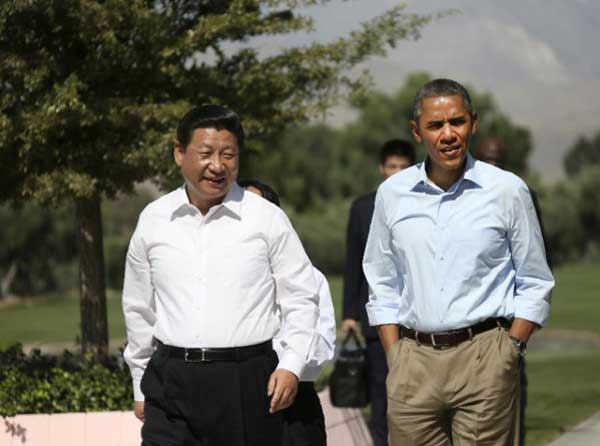

 |
|
In 2013, Xi had a meeting with US president Barack Obama in Annenberg Estate, California. [Photo/Agencies] |
Editor's note: President Xi Jinping's state visit to the US holds a lot of promise and can help resolve a lot of bilateral and global issues. Following is a summary of some scholars' expectations from this important visit.
Mutual respect the way forward
RUAN ZONGZE

China and the United States both are busy preparing for Chinese President Xi Jinping's state visit to the US to ensure it becomes a milestone in bilateral ties in the background of significant changes taking place across the world.
However, some in the US have appealed to the Barack Obama administration to "reconsider" the US' relationship with China, saying taking "harsh measures" against China, such as sanctions related to cybersecurity, has become necessary.
The reason: the usual clash of ideas during the US presidential election campaign, and attempts to get a better bargain before Chinese leader's visits by threatening to take harsh measures.
Therefore, Xi's visit to US is a precious opportunity for the two countries to promote coordination as well as to eliminate these misunderstandings. In this context, the two sides need to make more efforts in the following areas.
They have to reaffirm the mutual vow of building a "new model of major-country relationship" based on mutual respect which has no place for conflicts and confrontations. In fact, this was the theme of their two summits in the past two years and it should continue.
Controlling and managing differences between China and the US is critical to better bilateral relationship. There are structural differences between China and the US, but most of them are simply caused by the lack of positive interactions. For example, the two sides almost routinely argue on cybersecurity, which is a new area without effective rules. So, the two countries need to hold more talks to draft rules for cyberspace, because if either side uses measures like sanctions, the situation can only get worse.
As the world's largest and second-largest economies, China and the US have formed a community of common responsibility. They can also map out a new route to avoid the power struggles that history has seen whenever the world's power balance has started shifting from one country to another. By doing so, China and the US will also fulfill their responsibilities toward the whole world, to which their conflicts can deal a mighty blow.
The author is vice-president of and a senior researcher at the China Institute of International Studies.
Related Stories